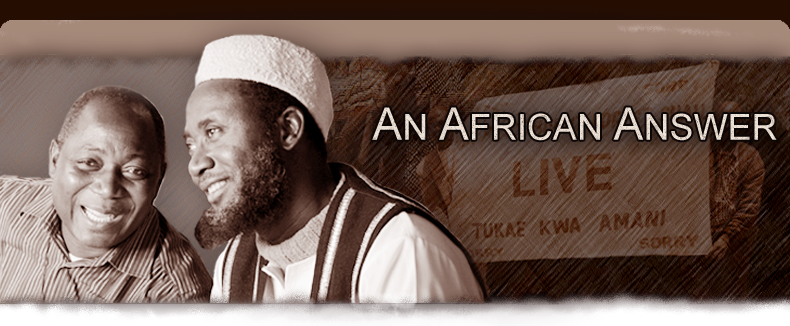'The best way to convert your worst enemy is to turn him into your best friend.' – Imam Ashafa
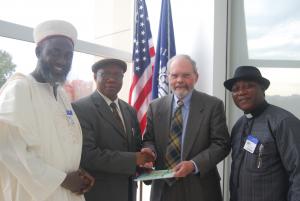 Nigerian Imam Muhammad Ashafa and Pastor James Wuye were in Washington Washington 26 - 31 October for the US launch of the documentary An African Answer. This film shows these two former militia leaders sharing their experience and promoting reconciliation in Kenya after the communal killings early in 2008 that followed disputed parliamentary elections. Burnt Forest, where the documentary was filmed, was the district worst hit by the post-election violence, in which over 1000 people were killed and hundreds of thousands displaced from their homes. An African Answer is a follow-up to the 2006 documentary The Imam and the Pastor, and intends to illustrate the methodology the Imam and Pastor employ to build inter-communal reconciliation and peace.
Nigerian Imam Muhammad Ashafa and Pastor James Wuye were in Washington Washington 26 - 31 October for the US launch of the documentary An African Answer. This film shows these two former militia leaders sharing their experience and promoting reconciliation in Kenya after the communal killings early in 2008 that followed disputed parliamentary elections. Burnt Forest, where the documentary was filmed, was the district worst hit by the post-election violence, in which over 1000 people were killed and hundreds of thousands displaced from their homes. An African Answer is a follow-up to the 2006 documentary The Imam and the Pastor, and intends to illustrate the methodology the Imam and Pastor employ to build inter-communal reconciliation and peace.
An illustrated Resource Guide for Grass-roots Practitioners authored by Imam Ashafa and Pastor James and edited by Alan Channer accompanies the films. Also available is a detailed Manual on using the films to facilitate dialogue and peace-building by Dr David Steele.
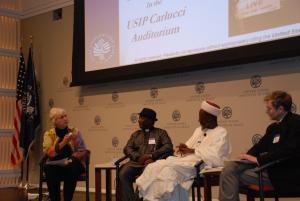 Along with British film director Dr Alan Channer and Kenyan production consultant Joseph Karanja, they first presented the film at the United States Institute for Peace (USIP), which commissioned the film. Whilst their old friend Dr David Smock chaired the occasion, Maureen Fiedler, of National Public Radio’s Interfaith Voices, moderated the discussions and plumbed the full depth of their remarkable story. Mr Karanja spoke of the dramatic impact the Nigerians had on Burnt Forest – an area prone to cycles of violence and where many previous attempts at ethnic reconciliation had failed – and how peace has taken hold and economic activity picked up pace in the wake of their intervention.
Along with British film director Dr Alan Channer and Kenyan production consultant Joseph Karanja, they first presented the film at the United States Institute for Peace (USIP), which commissioned the film. Whilst their old friend Dr David Smock chaired the occasion, Maureen Fiedler, of National Public Radio’s Interfaith Voices, moderated the discussions and plumbed the full depth of their remarkable story. Mr Karanja spoke of the dramatic impact the Nigerians had on Burnt Forest – an area prone to cycles of violence and where many previous attempts at ethnic reconciliation had failed – and how peace has taken hold and economic activity picked up pace in the wake of their intervention.
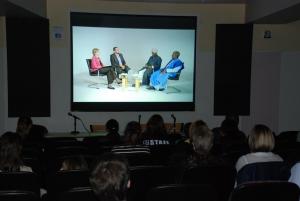 Subsequent screenings were held at American and Eastern Mennonite Universities and at the Berkley Center for Religion, Peace and World Affairs at Georgetown University. Some remarked how these occasions were amongst the best they hosted.
Subsequent screenings were held at American and Eastern Mennonite Universities and at the Berkley Center for Religion, Peace and World Affairs at Georgetown University. Some remarked how these occasions were amongst the best they hosted.
Seeing these formerly bitter enemies sit side-by-side answering questions and justifying their call for healing and reconciliation through their respective faiths was in itself remarkable. Both the Imam and the Pastor shared their own personal experiences simply and honestly, using their stories to inspire the audience, just as they had with the Kenyans.
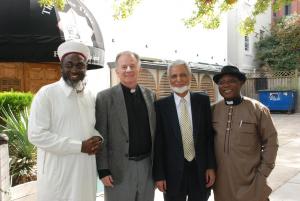 They met privately with senior staff of the Senate and House Foreign Relations Committees and with officials from the State Department’s Office on International Religious Freedom, amongst other offices, World Vision International (WVI), Ashoka, Creative Associates, International Center for Religion and Diplomacy and the Islamic Society of North America. The latter hosted a lunch with the Chaplain to the House of Representatives, Rev Patrick Conroy, and arranged for Imam Ashafa to lead prayers and deliver the Friday sermon near the White House, where a particularly insightful exchange took place with Rashad Husain, U.S. Special Envoy to the Organization of Islamic Cooperation.
They met privately with senior staff of the Senate and House Foreign Relations Committees and with officials from the State Department’s Office on International Religious Freedom, amongst other offices, World Vision International (WVI), Ashoka, Creative Associates, International Center for Religion and Diplomacy and the Islamic Society of North America. The latter hosted a lunch with the Chaplain to the House of Representatives, Rev Patrick Conroy, and arranged for Imam Ashafa to lead prayers and deliver the Friday sermon near the White House, where a particularly insightful exchange took place with Rashad Husain, U.S. Special Envoy to the Organization of Islamic Cooperation.
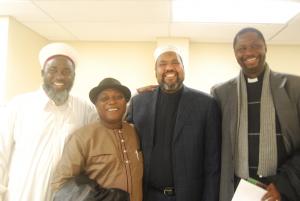 Imam Mohamed Magid hosted a packed interfaith event and dinner at his All Dulles American Muslim Society (ADAMS). In conversation before the public event we learned how this community generously contributed many thousands of dollars for the rebuilding of churches in Pakistan damaged in sectarian violence. This set the scene for a very engaging and profound exchange during the meeting, with the international audience attentive to the message of James and Ashafa. It was difficult for them to leave, as both were having healing conversations afterwards on topics ranging from the pain of the apartheid era in South Africa to divisions within families.
Imam Mohamed Magid hosted a packed interfaith event and dinner at his All Dulles American Muslim Society (ADAMS). In conversation before the public event we learned how this community generously contributed many thousands of dollars for the rebuilding of churches in Pakistan damaged in sectarian violence. This set the scene for a very engaging and profound exchange during the meeting, with the international audience attentive to the message of James and Ashafa. It was difficult for them to leave, as both were having healing conversations afterwards on topics ranging from the pain of the apartheid era in South Africa to divisions within families.
Pastor James and Imam Ashafa also attended the Search for Common Grounds Awards Ceremony, where they met fellow past and present Awardees – including former Assistant Secretary of State for the Middle East Hal Saunders. Here they also had another chance to talk to Daniel Baer, Deputy Assistant Secretary of State, who co-hosted the launch at USIP.
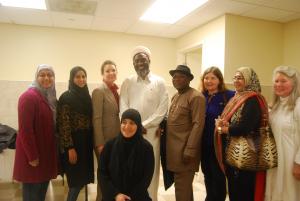 Dr Katherine Marshall graciously honored them in her home for a special reception, co-hosted with USIP’s Susan Hayward. Many of those present were old friends– like Dr Mohammed Abu-Nimer who uses The Imam and Pastor extensively and to great effect in Iraq and Sri Lanka. Another was Dave Robinson from World Vision International, who has used the film in different parts of Africa and has ordered another 1000 copies to be used as part of a training program for their global staff. Jennifer Douglas, amongst the first Westerners to get to know them and invite them to their first international conference, was also present. So was Dr David Little, who wrote about them in Peacemakers in Action, published by Tanenbaum Center for Interreligious Understanding.
Dr Katherine Marshall graciously honored them in her home for a special reception, co-hosted with USIP’s Susan Hayward. Many of those present were old friends– like Dr Mohammed Abu-Nimer who uses The Imam and Pastor extensively and to great effect in Iraq and Sri Lanka. Another was Dave Robinson from World Vision International, who has used the film in different parts of Africa and has ordered another 1000 copies to be used as part of a training program for their global staff. Jennifer Douglas, amongst the first Westerners to get to know them and invite them to their first international conference, was also present. So was Dr David Little, who wrote about them in Peacemakers in Action, published by Tanenbaum Center for Interreligious Understanding.
During their various meetings, they many voiced the pressing need to translate their films into Swahili and Hausa. UNDP requested their help to build reconciliation in Chad, and discussed a possible collaboration on a major educational initiative in a Middle East country.
In the midst of official engagements, James and Ashafa took time to comfort the family of a departed friend, encourage people of all ages in the various homes that hosted them, give insights into recent bomb blasts in Nigeria , shared their amazement about witnessing Muslim Prayers held in a Church, and grant several interviews. These two men’s story of how they were able, through reason, faith, and a lot of introspection, to move beyond their mutual fear of one another in order to work together to bring about a culture of peace and coexistence in Nigeria was inspiring. The approach these men used to bring about reconciliation between different tribes in Kenya through dialogue and collaborative action can be applied in many parts of the world. Their example and methodology should be encouraged and exported wherever there is conflict.
Imam Ashafa and Pastor Wuye reminded one of their hosts, Marvin Pace, of a metaphor about plywood - which turns many individually flawed and weak layers into a material of amazing strength and usefulness. But plywood does not make itself - the elements need to be bonded together. 'James and Ashafa seem to bring this metaphor to life. … Perhaps their conviction that their friendship has vital importance, that, as James says, they cannot divorce because it will hurt the children, so they must continue to work at it. Perhaps the people like us they encounter together along the way help cement their bond…Their humility also seems to play a key role, allowing the bonding to set before human fears and desires rip everything apart…'
The visit to Washington was arranged and supported by USIP and Initiatives of Change.
Yara Zgheib and Charles Aquilina
